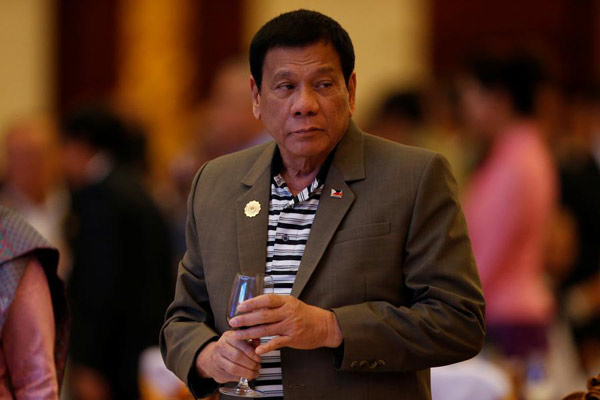New Philippine president seeks better relations with China
- By Tim Collard
 0 Comment(s)
0 Comment(s) Print
Print E-mail China.org.cn, October 17, 2016
E-mail China.org.cn, October 17, 2016
|
|
|
Philippine President Rodrigo Duterte attends a welcome dinner at the ASEAN Summit in Vientiane, Laos September 6, 2016. [Photo/Agencies] |
When Rodrigo Duterte was elected president of the Philippines earlier this year, there was much concern and speculation as to how this might turn out; Duterte has always been known as a radical and outspoken politician, and some Filipinos feared he might set the country on a confrontation course with China amid long-standing disputes over islands in the South China Sea.
In fact it looks as though the reverse is occurring. Though the former Philippine government challenged China's stance of the dispute in a UN-based court, Duterte appears to have signalled from the start that he wishes to refrain from confrontation, preferring to deal on a bilateral basis corresponding to the Chinese position.
This forms part of a re-thinking of established government policy based on a firm alliance with the USA. Duterte's radical approach to the drug problems at home has attracted unwelcome criticism from President Obama personally, which has caused a rift between the two countries. Duterte has announced a halt to joint U.S.-Philippine military exercises, and the relationship is clearly under some strain.
Duterte clearly thinks his war on drugs could benefit more from close cooperation with China, as both countries share a deep concern on the issue, and, in Duterte's view, many Filipino criminals have links to China-based crime syndicates; thus official cooperation may bear fruit.
Duterte has already sent the 88-year-old former Philippine President Fidel Ramos as a special envoy to China on a confidence-building mission, and plans an October visit himself. This proposal has received a warm welcome, a Chinese Foreign Ministry spokesperson saying: "We have expressed our welcome to a visit on many occasions. We hope that he can make this trip as soon as possible." China's Ambassador in Manila Zhao Jianhua repeated this welcome at his country's National Day reception in Manila on September 27.
As well as attempting to form a working relationship on South China Sea issues and drugs, Duterte also hopes to apply to China for trade and economic assistance, as well as tapping into the Chinese speciality of infrastructural development in a more solid and constructive relationship. He plans to bring with him a business delegation seeking to attract Chinese investment in the southern Philippine island of Mindanao, the president's home territory and one of the poorest regions.
Given that China's established policy, especially since the launch of the AIIB earlier this year, is to use economic cooperation as a way of building firm relationships with neighboring countries and even with those at a greater distance, the Philippines represents an ideal regional partner in many ways.
The country, which consists of a large number of islands and a regular victim of natural disasters such as earthquakes and typhoons, could benefit hugely from Chinese aid for her inevitably fragmentary infrastructure, and from all kinds of Chinese investment. It is not poor in natural resources, but has not been able to exploit them to best effect so far.
A further element in the burgeoning Sino-Philippine relationship is the role that the latter can play in dealings with other countries in the region that are somewhat at odds with China. Duterte visited Vietnam at the end of September, where he compared notes on South China Sea issues.
It is likely he is urging a more conciliatory policy towards China on the Vietnamese leadership, which may cause some concern to the Americans. Likewise, the president is also hoping to visit Japan in October; Japan and the Philippines have enjoyed warm relations for some time, and it will be interesting to see how Duterte manages to sell his conciliatory policy towards China.
It is not, of course, likely that Duterte is signalling a complete U-turn in Philippine foreign policy. However, it is sensible for him to strike a balance between the traditional U.S.-Philippine alliance and the regional political and economic influence of China.
It can only be hoped this approach will encourage other regional powers to engage constructively with China in the South China Sea.
President Duterte may be a controversial figure on the world stage: but in world history it has frequently been necessary for a statesman to be bold, imaginative and unpredictable in order to cut through complications and enable real progress. Hopefully, his approach can lead to a lowering of tension in the seas around East Asia and a more constructive approach to the region's problems.
Tim Collard is a columnist with China.org.cn. For more information please visit:
http://www.ccgp-fushun.com/opinion/timcollard.htm
Opinion articles reflect the views of their authors, not necessarily those of China.org.cn.






